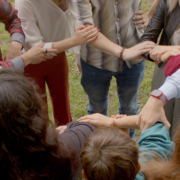The advice seemed so obvious, I was caught off-guard by its simplicity.
I was part of a conference workshop in which everyone in the room was asked to find a partner and to stand facing them about 600mm (2′) away. Then, we were asked to place our hands, palms facing forward, onto our partner’s hands about shoulder height.
When ready, keeping our feet fixed on the floor, the shorter of the two was asked to push against their partner’s hands.
The set-up, so far, was familiar – I know it as a fun game called Palm Off in which each person aims to be the first person to bring their partner off balance. But this was different because only one person was asked to push.
Then this happened…
In almost all cases, as the shorter person pushed, their partner pushed back, ostensibly to avoid being pushed over. Naturally, the shorter person then asserted their role and pushed even harder, which of course, caused their taller partner to dig their heels in and push back even more, etc, etc. This described my experience exactly.
The workshop facilitator, Will Dobud, then connected this to the experience of what happens when we, as group facilitators and program leaders, push people. They almost always push back.
His advice – when you meet resistance, stop pushing.
This is so true.
Of course, every situation is different, but generally speaking, the more you push the more the other person will want to push back. It is rare indeed for someone to be pushed and respond with, ‘Oh, okay, that’s better.’
The Impact of Pushing Your Groups
I have often shared in my training workshops that if you meet resistance in your program, one of the primary reasons will be because your group is not comfortable going where you want them to go. Metaphorically speaking, this is the same as the taller person pushing back. No amount of further pushing is going to correct this situation.
Better to acknowledge the resistance, stop pushing and reflect. Try something new, process your group’s experience, consider a new strategy to move forward, and so on.
Because, you know what they say – the definition of insanity is doing the same thing over and over and expecting a different result.
What do you think?
Are there times when you should push past the resistance?
No Comments

No Props No Problem
Best-selling book featuring 150+ fun group games & activities. Scan QR codes to access digital content including videos.

NEW – EMOJI Cards
Brand new deck of cards featuring emoji images to help you inspire conversations about emotions, feelings & experiences.
Top Ten Icebreakers & Group Games
Download our free 28-page ebook jam-packed with outrageously fun activity ideas.
Just one more question:
I am interested in…
If You Meet Resistance, Stop Pushing
Share this with friends and colleagues.
Choose a plan that’s right for you
We offer a range of membership plans with no surprises.
Click an option below & discover our simple pricing.

Individual
Click here if you’re a:
- Teacher
- Corporate trainer
- Outdoor educator
- Camp leader
- Youth leader
- Conference organiser
- Therapist/counsellor
Membership Plans

Enterprise
Click here if you represent a:
- School
- Corporation
- Community-based Organisation
Explore plans for
10, 50, 200 or more
potential users
Membership Plans









Original post December 2019, last updated September 2020.